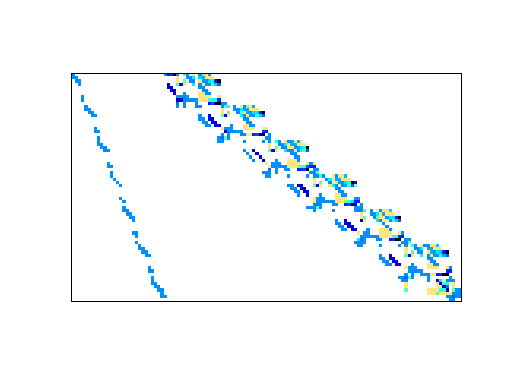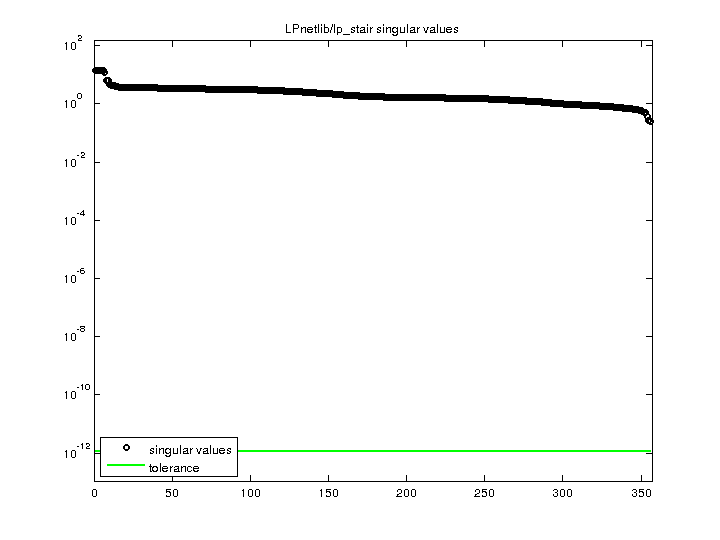LPnetlib/lp_stair
Netlib LP problem stair: minimize c'*x, where Ax=b, lo<=x<=hi
| Name |
lp_stair |
| Group |
LPnetlib |
| Matrix ID |
691 |
|
Num Rows
|
356 |
|
Num Cols
|
614 |
|
Nonzeros
|
4,003 |
|
Pattern Entries
|
4,003 |
|
Kind
|
Linear Programming Problem |
|
Symmetric
|
No |
|
Date
|
|
|
Author
|
M. Saunders |
|
Editor
|
D. Gay |
| Structural Rank |
356 |
| Structural Rank Full |
true |
|
Num Dmperm Blocks
|
1 |
|
Strongly Connect Components
|
1 |
|
Num Explicit Zeros
|
0 |
|
Pattern Symmetry
|
0% |
|
Numeric Symmetry
|
0% |
|
Cholesky Candidate
|
no |
|
Positive Definite
|
no |
|
Type
|
real |
| SVD Statistics |
| Matrix Norm |
1.464861e+01 |
| Minimum Singular Value |
2.564993e-01 |
| Condition Number |
5.710977e+01
|
| Rank |
356 |
| sprank(A)-rank(A) |
0 |
| Null Space Dimension |
0 |
| Full Numerical Rank? |
yes |
| Download Singular Values |
MATLAB
|
| Download |
MATLAB
Rutherford Boeing
Matrix Market
|
| Notes |
A Netlib LP problem, in lp/data. For more information
send email to netlib@ornl.gov with the message:
send index from lp
send readme from lp/data
send minos from lp/data
------------------------------------------------------------------------------
This LP problem is the source of four sparse matrices in the Harwell/Boeing
sparse matrix collection: STR_0, STR_200, STR_400, and STR_600. Those four
matrices are square, nonsingular basis matrices that occured during the
solution of STAIR.
------------------------------------------------------------------------------
The following are relevant excerpts from lp/data/readme (by David M. Gay):
The column and nonzero counts in the PROBLEM SUMMARY TABLE below exclude
slack and surplus columns and the right-hand side vector, but include
the cost row. We have omitted other free rows and all but the first
right-hand side vector, as noted below. The byte count is for the
MPS compressed file; it includes a newline character at the end of each
line. These files start with a blank initial line intended to prevent
mail programs from discarding any of the data. The BR column indicates
whether a problem has bounds or ranges: B stands for "has bounds", R
for "has ranges". The BOUND-TYPE TABLE below shows the bound types
present in those problems that have bounds.
The optimal value is from MINOS version 5.3 (of Sept. 1988)
running on a VAX with default options.
PROBLEM SUMMARY TABLE
Name Rows Cols Nonzeros Bytes BR Optimal Value
STAIR 357 467 3857 27405 B -2.5126695119E+02
BOUND-TYPE TABLE
STAIR UP FX FR
From Michael Saunders, Systems Optimization Laboratory at Stanford University.
When included in Netlib: Explicit zeros omitted;
cost coefficients negated.
The following are relevant excerts from lp/data/minos (by Michael Saunders),
regarding experience with MINOS 5.0 on the problems he provided:
(unscaled) (scaled)
File Name Rows Cols Elems Optimal Objective Itns Time Itns Time
---- -------- ---- ---- ----- ----------------- ---- ---- ---- ----
11. STAIR 357 467 3867 2.5126695E+02 MAX 519 15.7 389 13.1
* Objective is the first row of type N. It is minimized except as shown.
* Itns is the number of iterations required to solve the problem
by the primal simplex method, as implemented in the Fortran
code MINOS 5.0 (May 1985), using default values for all
parameters. (The initial basis is triangular.)
* Time is the processor time required on an IBM 3081K. The MINOS
source code was compiled with the IBM Fortran 77 compiler
VS FORTRAN, using the options NOSDUMP, NOSYM and OPT(3).
|


